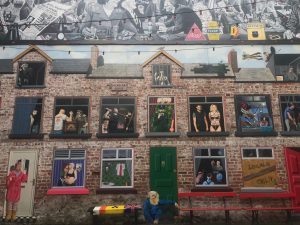Last weekend, I was able to travel to Northern Ireland, a different country on the same island. I simply boarded a train in Dublin and arrived in Belfast two hours later. No one checked my passport or even a photo ID. Yet, when I stepped off the platform I was in another country (Northern Ireland is apart of the United Kingdom). Northern Ireland and the Republic of Ireland have a tenuous history, particularly known for a divide between Protestants in the North and the Catholics in the South. Currently, Northern Ireland is maybe physically 20% of the island which the two countries share. Once in Belfast, I immediately felt the differences between the two nations.
- Their accent is a distinct mix between British and Irish
- They use sterling since they are a member of the UK
- There is no use of the Irish language, everything is only in English
- They continuously refer to the anywhere else on the island as “down South”
- Northern Ireland is much more religious
- More typically ‘controversial’ laws are illegal such as abortion and gay marriage
You could imagine my immediate confusion when they started calling Dublin “the South” when it is located in the middle of the east coast. There were things distinctively Irish about these people as well; the split of the countries didn’t occur until the 20th century.
However, I was surprised by the amount of angst that filled Belfast. As you walk the streets, there are murals depicting war, religion, and people on walls which used to divide within the city Protestants and Catholics. During my walk in the city center, I visited city hall to be greeted by a protest held by Sinn Fein. Sinn Fein is a liberal Irish pol itical party that was holding a protest for Northern Ireland to stay in the European Union.
itical party that was holding a protest for Northern Ireland to stay in the European Union.
One of the most talked about issues in Ireland (both Northern and the Republic) is how the border will be handled after Brexit. The last time there was a hard border on the Irish island it was surrounded by bloodshed. While there isn’t an expectation this will occur again, people do not like the idea of limitations on traveling to and from Belfast and Dublin for work, school, or leisure. The border itself is poorly drawn and crosses around highways and farms making it hard to introduce checkpoints. In the Brexit vote, Northern Ireland voted to stay in the European Union, but it was not enough to sway the majority in England and Wales. I have heard some talk of the two nations rejoining into one Ireland; however, this seems unlikely.
This is one of the true benefits with immersing yourself by living in another nation. Only then could I understand these differences and quirks. I gained the insight by studying their history and listening to all that goes around me in Ireland.
